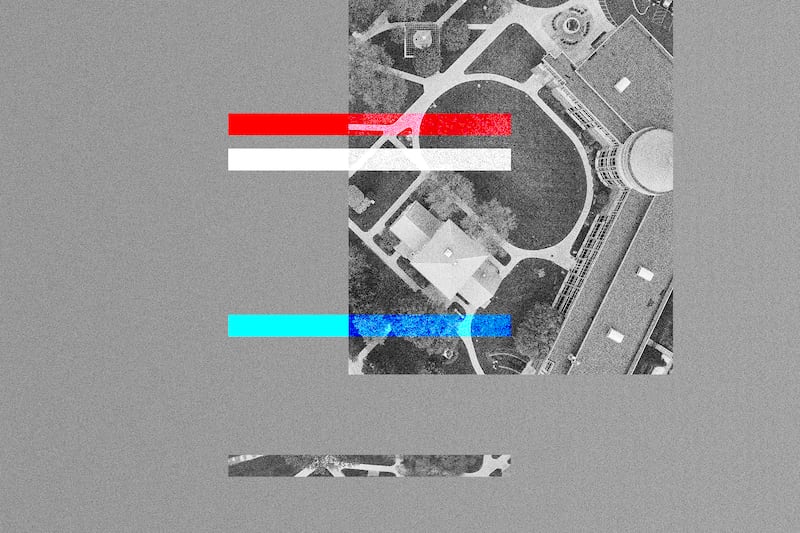The most politically balanced student body among three of the top schools in Utah was at Brigham Young University, according to a new survey from the Center for the Study of Partisanship and Ideology. Of the three Utah universities included in the survey, Utah State University had the most conservative student body, while the University of Utah’s students tilted more to the left.
The study, released earlier this month, ranked 159 of the top U.S. schools according to the political and ideological diversity of their students. The findings were based on 2020 and 2021 surveys of 57,000 undergraduate students in the U.S. conducted by the Foundation for Individual Rights and Expression, which advocates for free speech on college campuses.
Unsurprisingly, colleges students in the U.S. tend to be more liberal than Americans as a whole, with significantly fewer conservative students at liberal arts and Ivy League schools. “Democrats outnumber Republicans by a 55-23% margin on campus, and liberals outnumber conservatives 53-21%,” the study says. “Elite students are thus two-thirds more Democratic and twice as liberal as the American population.”
Only 10-15% of students at Ivy League schools identify as conservative, while 60-75% identify as liberal.
The most politically diverse school in the nation, according to the study, is the University of Arkansas, while Smith College in Massachusetts came in last. At Smith, only 1% of students identified as conservative, according to the study. Student bodies at public universities – especially large, flagship schools – were more likely to be politically balanced, although most are still more liberal than the general population.
BYU ranked as the 26th most politically balanced university in the survey, while USU came in 44th and the U. ranked 45th. Utah’s top schools had some of the most conservative student bodies in the survey, with USU ranked second and BYU ranked third for the number of students identifying as conservative.
Previous rankings on the relative conservatism of college campuses showed differing results, with Niche, an education analytics organization, ranking BYU the most conservative college in America, with BYU Idaho at 6th, and Utah State coming in 9th. BYU Idaho was not included in the CSPI study. But a Princeton Review top 25 list of conservative campuses, based on student ratings, didn’t include BYU or USU, but ranked the U. as 9th most conservative.
The latest study by CSPI used data based on students’ own reporting of their political ideology and political party membership. That study showed:
- BYU’s student body was 32% liberal, 20% moderate and 48% conservative, with 30% of students identifying as Democrats and 49% as Republicans.
- At USU, 49% of students identified as conservative, compared to 21% moderate and 30% liberal, while 30% said they were Democrats and 51% Republicans.
- Among students at the U., 51% of students identified as liberal, with 26% choosing moderate and 23% conservative, while 49% of students said they were Democrats and 24% Republicans.
The most conservative campus in the nation was Hillsdale College in Michigan, where 76% of students identified as conservative. Most of the schools from the west in the survey ranked in the top 50, with the University of Wyoming ranked 21st, the University of Idaho at 30th, and Arizona State coming in at 39th.
The study’s author, Eric Kaufmann, professor of Politics at Birbeck College at the University of London, said he thinks viewpoint diversity is important on college campuses because students are less likely to conform to the opinions of their peers if they aren’t alone in their beliefs.
“If universities are serious about improving diversity, they need to be paying far more attention to the political diversity on their campuses,” Kaufmann said. He criticized university policies that require faculty to “pledge allegiance” to Diversity, Equity and Inclusion statements, saying they deter viewpoint diversity.
“This, alongside universities taking political positions and failing to defend the freedom of speech of conservatives, creates a hostile environment for dissent and drives conservative and other dissenters from academia,” he said in an email.
The FIRE survey is conducted every year to determine the status of free speech on college campuses. One of the questions students are asked is whether or not they self-censor in class, and Kaufmann noted that students at colleges with less viewpoint diversity were more likely to say they didn’t feel comfortable speaking out, and that was particularly true of students in the political minority.
In a phone interview, Sean Stevens, senior research fellow at FIRE, said it isn’t just conservative students who feel like they can’t share their views, this year’s survey also shows a lot of moderately liberal students – the largest category of students – also feel like they can’t express themselves freely.
“On some things where their views are closer to the center, or the one issue they have a conservative view on — like thinking abortion should not be legal up until birth — they feel like they can’t say things like that out loud,” he said.
Stevens also pointed out that creating an echo chamber for students on campus can hurt them when they’re out of school, opening them up to being “blindsided” by conservative arguments they don’t know how to respond to. And when students aren’t exposed to people who think differently than they do, they start to “create caricatures” of other people, he said.
Schools that are more ideologically diverse do better at providing an environment where students feel open to expressing their views, Stevens said. And for society as a whole, viewpoint diversity is important because eventually what happens on college campuses ends up in our institutions and workplaces.
“These ideas originate on campus, but five or ten years later they penetrate the mainstream,” he said.


